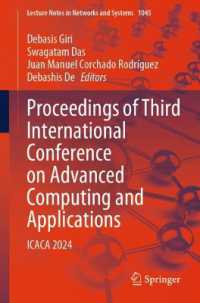- ホーム
- > 洋書
- > 英文書
- > Religion / Ethics
Full Description
In What the World Should Be, Malcolm Magee demonstrates that Woodrow Wilson was immersed in a Presbyterian tradition that shaped his presidency. He argues that Wilson's religious convictions shaped his concepts of effective leadership, the way he reasoned, and his use of language. In particular, Wilson's religious beliefs accustomed him to the theological principle of antinomy: that two principles could both be right even when, considered only in the light of logic, they appear mutually contradictory. These convictions ultimately made Wilson believe he was providentially chosen to bring divinely ordered freedom to the nations and peoples of the earth.
Contents
Acknowledgments
Introduction
1. The Development of Woodrow Wilson's Thought to 1913
2. The Challenge of the Present Age: The Persistence of the International Order
3. Keeping to the Principles in Peace and War
4. Negotiating the Tablets of Stone
Epilogue
Appendices
I. "Christ's Army"
II. Wilson's "Fourteen Points" Address to Congress
III. The Covenant of the League of Nations
IV. Inaugural Address at Southwestern Presbyterian University
Notes
Bibliography
Index








